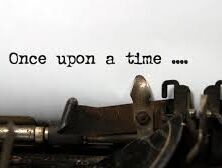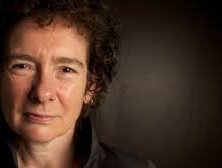Dear Thelma You know, with all the walking and looking around, endlessly looking around for something, anything, you forget how cold it is here. And where is “here” anyway? I know I sound negative but it’s hard, so hard. Cooper’s finally collapsed into a permanent low-mood; “He’s not depressed,” Scott insisted; “he’s just very terrified all the time.” “Of what?” I asked. “I dunno,” he said, “but I found him trying to insulate his head last night with a crate.” He returned to his sketchbook into which he draws portraits of his relatives from memory. Unfortunately, all his photographs were stolen. We’ve looked everywhere but not a sign so far. He used to enjoy copying them out with a burnt stick; all our pencils were used up when the kindling combusted. Still, he likes that auld stick. Scratcher and The Shifter have got old. They used to be thick as thieves, always pulling and tearing at dead stuff and eating bits of Browny. Now they just lick at each other and try to bury themselves alive in the ice. Scott wanted them shot but Cooper’s aunt wouldn’t hear of it so Scott would change the subject to Western man’s reimagining of the snow through adversity which nobody wanted to know about. Bloom’s gone again. He got up yesterday morning and told everyone, “I’m going outside; I may be gone some while. Don’t wait up,” and off he went, nude, except for a huge hat and waving at nothing. “He’ll be back,” Scott insisted. “Feck him,” Tawny Owl grunted; “let him off, mad bastard.” Tawny Owl came to my part of the tent yesterday and told me he had something to tell me. He looked about him several times and stretched and sang the first...
Cian Morey, writer
posted by Cloud
It’s my privilege to know Cian. He’s 15 but when you’ve got what we like to call “talent” (one word just doesn’t seem to contain adequately that cocktail of qualities, of enviable attributes) age doesn’t matter. Wasn’t it JFK who said that someone’s age should not necessarily factor in our assessment of them. Though we can all hope to attain greater skills and understanding with time, some – the chosen few – have it at a young age and Cian is one of those. He was published recently in “The Irish Times” (Fighting Words supplement, Wednesday, May 11th). The excerpt is from his novel “Aether.” The prose is phenomenal, dense but with a scarily ferocious energy; reading Cian’s description is like being there – no, it is being there. Take this, my favourite bit from his published excerpt: “Sinister figures stalked the alleyways; fallen women flocked in the shadows; intoxicated, boisterous brutes surged in and out of alehouses and gin mills, to stagger or brawl their way across the street. An assortment of buildings pumped an assortment of fumes into the sky from their chimneys. Silhouettes of airships and aircabs floated slowly past the lunar corona.” I know what some might say: they’ll think it’s overwrought, all that alliteration and hyperbole. But it’s like Baz Lurhmann’s movies: it’s wretched, it’s exciting, it’s lurid, it explodes with colour and darkness in equal measure and black is not a colour, technically; I bet Cian could make it so – he’d put the words to it. He’s like a conjurer in that way: “The man clasped a wine glass in his spindly hands, but I noticed that none of its contents had yet met his mouth. He stood quite still, but his eyes roved about expeditiously, settling...
“Why be Happy when You can be Normal?” by Jeanette Winterson...
posted by Cloud
This is an extraordinary autobiography. It feels like a novel because of the vivid and persistent way she presents her mother to whom she only refers as “Mrs Winterson.” The latter is impossibly mad and cruel and just plain weird. And yet you believe that this is Jeanette’s mother or at least her adoptive mother. Her biological mother was “a little red thing from out of the Lancashire looms…from the village of Blakely where Queen Victoria had her wedding dress made.” One can hardly imagine the writer would have been worse off had she not been adopted; sure, her real mother was just 17 years old and probably living in penury but at least she might have been loved. Mrs Winterson, if one wished to be compassionate, could be said to have been capable, to a modest degree and in a very odd fashion, of loving Jeanette but she certainly failed miserably to understand her. One instance of this abject incompetence relates to book-reading: “It never occured to [my mother] that I fell into the books – that I put myself inside for safe-keeping.” This failing is especially significant when we read that her mother burned all her books. And this is just an example of how Mrs Winterson failed as a mother even back in the 60s when things were not as touchy-feely and PC as now. While “there were plenty of kids who didn’t get fed properly” there must have been few enough who were locked in the “coal-hole” or outside on the front door step all night. There isn’t time here to offer a definite inventory of Mrs Winterson’s parental transgressions; suffice to say that neither Jeanette nor her father believed for a moment that Mrs Winterson would be happy in...
A Month in the Country by J.L. Carr...
posted by Cloud
“A Month in the Country” recounts the time our hero Tom Birkin spent restoring a mural in an old church in Oxgodby. He’s a veteran of The Great War and hasn’t come away from it unscathed. The work excites him and seems to be just what he needs perhaps to recover from the war but also to satisfy his innate need for solitude. Having learnt the trade from Joe Watterson who’d told him, “It’s a profession, my boy,” one that would allow him to “starve without competition.” Birkin lands a job from Reverend J.G. Keach by whose wife Birkin is enchanted. The Reverend doesn’t attempt to conceal his contempt, if not for Birkin then for his work. The money could be better spent elsewhere. Nonetheless the job opens up a world of sorts for Birkin not least because of the attentions of some compassionate and welcoming locals such as the teenaged girl Kathy Ellerbeck. Oxgodby is beautifully bucolic and Carr gives it due regard in the language. There’s something very English about both Carr’s and Birkin’s love of the countryside and it seems especially poignant in light of what Englishmen suffered just a couple of years before in France. Some of the description is idyllic: “Why the place was a latter-day Eden!” More of it is gothic: “the hair rose on my neck and I turned with utmost reluctance, really afraid of what I might see…[the cat] had a fluttering song-thrush clamped in its bloody jaws and glared through the window, malevolently eyeing each of us in turn.” More than once does nature (in the form of tree branches) encroach on civilisation by pressing against windows. Objects are imbued with a strange sadness; the dysfunction in relationships is obliquely adverted to; the war is...




